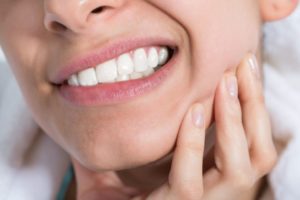Why Is My Toothache Worse at Night?
April 21, 2023
 If you have a toothache that seems to get worse at night, you may not be imagining it. Toothaches can intensify after you go to bed, but you don’t have to spend the night tossing and turning. Here’s how you can avoid a sleepless night from dental pain until you can see your emergency dentist.
If you have a toothache that seems to get worse at night, you may not be imagining it. Toothaches can intensify after you go to bed, but you don’t have to spend the night tossing and turning. Here’s how you can avoid a sleepless night from dental pain until you can see your emergency dentist.
Triggers of Nighttime Toothaches
Contrary to common belief, an occasional toothache is not normal. It’s a symptom of an underlying problem, like tooth decay, a fracture, or a failing restoration. No matter the reason, it’s difficult to focus on anything else but dental pain when calling it a night. Common triggers that can worsen your discomfort after the sun goes down, like:
- Late Night Snacking: Eating hard for chewy foods before bed can increase pain after you have finished your meal or snack.
- Fewer Distractions: Your mind can only focus on so many things at once. Since there are fewer distractions at night, you can pay more attention to your pain, which can make your toothache seem worse.
- Grinding or Clenching Teeth: Bruxism is a subconscious habit of grinding or clenching your teeth, especially while sleeping. Not only can you experience dental pain, but jaw soreness and morning headaches.
- Sleeping Position: Believe it or not, the position you lay in at night can lead to dental discomfort.
Managing Nighttime Toothaches
A toothache is not something you want to ignore. It is best to see your emergency dentist right away. While you wait for your appointment, here are a few tips to help you get a restful night’s sleep:
- Watch What You Eat: Avoid any hard or chewy foods too late in the day and don’t eat before going to bed.
- Manage Any Pain: Take an over-the-counter pain reliever to manage any discomfort. Applying a cold compress can also reduce tenderness and inflammation.
- Rinse with Salt Water: Rinsing your mouth with salt water can prevent pain and help fight inflammation and infections.
- Change Your Sleeping Position: Sleep with your pillow elevated to prevent blood from pooling in your head, which will prevent a throbbing toothache.
- Use a Nightguard: Wear a nightguard if you have a habit of grinding or clenching your teeth. It will provide a protective barrier between the upper and lower arches to preserve your natural smile and stop your pain.
Don’t wait to see if your toothache goes away on its own. Visit your dentist to find the source of your discomfort, so it can be treated before a small issue turns into a big problem.
About Dr. George T. Philip
Dr. Philip achieved his dental degree from the Nova Southeastern University College of Dental Medicine and has regularly pursued continuing education in various specialties to treat the most complex oral health issues. If you need an emergency dentist, request an appointment through our website or call (972) 961-4105.
No Comments
No comments yet.
RSS feed for comments on this post.
Sorry, the comment form is closed at this time.
